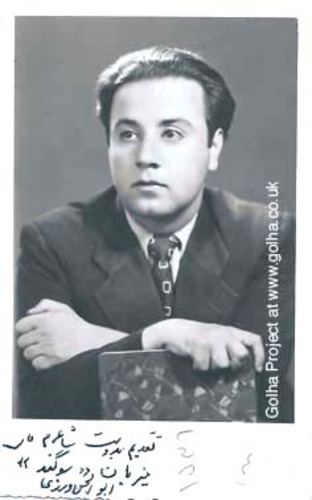Abu’l-Hasan Varzi

Biography
Varzi, Abu al-Hasan (1914-1989), son of Husayn Fallahzada. Poet, translator, and musician born in Tehran. Having received his primary and secondary education, he studied at the Faculty of Law and obtained his BA in 1936 when he attended literary societies in Tehran and made the acquaintance of poets. In his collegiate years at the Faculty of Law, he also studied at the Faculty of Theology and Philisophy (Theology and Islamic Teachings). When he was on assignment from the Ministry of Justice in Shiraz, he studied Jami’ al-Muqaddamat; Mughni; Mutawwal by Taftazani; Sharh-i Manzuma by Mulla Hadi Sabziwari; and parts of Asfar al-Arba’a under Mirza ‘Ali Hakim. In 1941, he was appointed the primministe’s special inspector in Qawam al-Saltana’s cabinet and later assumed further offices, such as head of the board of directors and the director-general of the Khurasan Agriculture Company (Shirkat-i Falahati-yi Khurasan); director-general of finance of Tehran Municipality; head of the directorate board of the Tea Company of Gila (Shirkat-i Chay-i Gilan); member of the delegation sent to nationalize the AIOC under Muhammad Musaddiq. He became acquainted in his prime of life with poetry, belles-lettres, and music, studied the tar, the violin, and the setar under masters like Musa Naydawud, and associated with many other musicians. A distinguished ghazal poet, Varzi had mastery in composing poetry in other genres. His style of ghazals is a combination of Iraqi and Indian. Intertwining novel themes in the eloquent forms of his predecessors, he took great care in composing modern poetry to follow classical rhetoric. Having mastery of the French language, he composed poetry in and translated some works from that language. His poetical compositions include: Sukhan-i ‘Ishq; Rahaward-i ‘Umr; and Divan of Poetry. His translations include: Barrasiha-yi Adabi and Haft Surat-i ‘Ishq by Andre Mauroi; Naghma-pardaz-i Namard by Dastoyevsky.
Asar-afarinan (6/ 108); Sukhanwaran-i Nami-yi Mu’asir-i Iran (6/ 3852-3858).